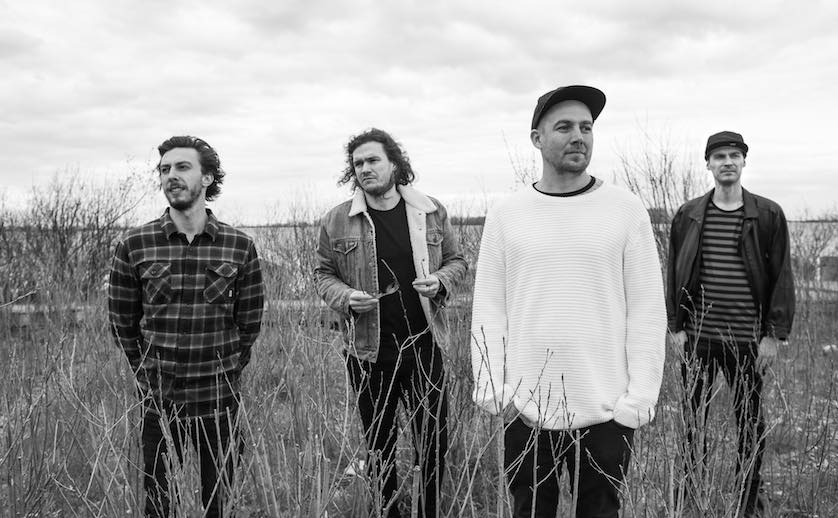
“It was a pinch-yourself moment,” says John Vella, frontman of Australian band Tenderfoot of when they first heard original compositions the band had written in Sydney, played by a full orchestra at the famed Abbey Road Studios.
All 11-tracks off their warm, nostalgia-laced debut album To Be Young were recorded there. The English Session Orchestra played on eight tracks with co-producer Julian Emery (Lissie, Nothing But Thieves) at the helm.
“We did all that orchestration—which [keyboardist Anthony Donlon] was a big part of—before we left for London,” explains Vella over a beer, in a North Sydney pub with bassist Joel Burton. “When the three of us got there and the orchestra started playing our songs, in that room with all that history, the hairs went up on our arms. We were like, ‘Whoa, craziest day ever!’”
The orchestration had to be meticulous. Each detail was programmed into a MIDI. Donlon then charted it all out before sending it to London for vetting. Vella adds: “It’s the first time we’ve had orchestra on anything. Previously, I would just program everything. The first time any of us had ever heard the strings on our songs was with the English Session Orchestra at Abbey Road!”
Soundtracks like Star Wars and more recently The Shape of Water are routinely recorded at the legendary studios, but its endearing ties to the Beatles, who recorded within those hallowed walls between 1962 to 1970, is how the studio is best remembered. Tomes have been written about the effect recording gear and vintage instruments present at the studios had on the Beatles’ experimentation and sound. Especially on albums such as Sgt Pepper’s Lonely Hearts Club Band and Abbey Road.
Much of the gear still remains there.
Eager to get as much Beatles into their album, the band used the two upright pianos as well as microphones that once pressed against the pursed lips of John Lennon and Paul McCartney.
Keyboardist Donlon is absent tonight, but when first told about Abbey Road and tasked with using an orchestra, it was him who casually suggested he could take it on, much to his bandmates’ surprise. Explains Burton: “When Audio Network said we would like to hear some strings on that, Anthony said, ‘I know how to do that!’ We were like, ‘What? You do? What do you mean?’ And he said, ‘That stuff is easy, I can do that.’”
Says Vella, with a smile: “He did a degree in Orchestration at University! We never knew.“
The result is a strong album that shows off their versatility. From upbeat, chorus-led pop of “She Calls” to rousing Coldplay-like “The Fixer.” Many of the songs are built around the sonic’s of Vella’s voice. It’s less Lennon/McCartney and more Bob Dylan, thanks to Vella’s natural troubadour-style. Donlon’s love for the coupling of strings and piano lends some songs a Bernie Taupin-Elton John edge and others a grander, cinematic effect. It’s easy to see why their music has already been used in several TV shows and the trailer of critically acclaimed Jia Zhangke film Mountains May Depart.
When Vella is allowed to sing unadorned, as in the reflective “O How Time Flies,” where space is created for quiet orchestral crescendos, that’s when their music is at its most emotionally affecting.
“It was one of the only times that I played a guitar on Facebook and did a demo of the song,” explains Vella of the song’s genesis. “It was called ‘Friday Night In’ because it was one of those times I just stayed home and wrote the guitar parts. We had just been given this opportunity to record with an orchestra and I thought this would orchestrate well.”
The song became a centerpiece for the album with the band picking through older songs such as “The Day We Met,” written eight years ago, and ones written more recently to fit with the album’s theme of facing the present, with a knowing nod to the rear-view mirror.
Explaining the mood he was in when the first words tumbled out, Vella says: “I had just realized that I’d been spending too much time on social media and I’m a big nostalgia kind of guy. It runs through everything for me—I love the Ninja Turtles and Point Break. I can’t get enough of classics that came out when I was a kid. A lot of my lyrics are nostalgic and when I wrote that song, I thought, ‘OK, this is the record.’”
“Life’s Not Perfect” is the only acoustic track on this album, sans orchestra. As such, you hear clearly Vella’s clipped Australian accent as he sings of a waning love affair; raw and stripped back. And it was done in one vocal take. “We had 20 minutes between finishing the piano parts and the orchestra arriving. I just jumped into it. They threw up the two mics that the Beatles had used,” Vella beams as he recounts. “I had to just close my eyes and say, ‘C’mon, this is the moment, don’t stuff it up.’”
It is not every day that an up-and-coming band from the other side of the globe gets to record at Abbey Road. It speaks to the band’s talent and promise, that U.K.-based music and publishing company Audio Network has thrown its weight behind them. The band which is now made up of Vella, Burton, Donlon and new drummer Rick Austin, have been around in some form, making music since 2008.
Apologizing for the absence of the other two members as he takes a sip of beer, Burton continues: “Rick is new, our old drummer that we’ve had for 10 years also plays with the Jon Butler Trio and when he goes on tour, he can be away for years on end, so we had to recruit Rick.”
Their best songs have a Bob Dylan meet Ryan Adams, radio-friendly vibe, with Dolon’s arrangements lending further heft on tracks like “Oh How Time Flies” and “The Fixer.” So it’s surprising they are hardly played on local radio home in Australia.
Burton, who has played with bigger acts such as Robbie Williams and Jennifer Hudson as a session bassist, explains: “If you’re not with a major label and you’re not on mainstream radio, you pretty much have just Triple J, and if they don’t champion you, or for whatever reason even hear of you, then the path is a lot harder.”
I put forth the theory that there’s a strong trend towards championing diversity and more female voices in music these days. “Well, that’s actually good,” adds Vella quickly. “We don’t want to stand in the way of any one getting a fair chance. But that just means we have to do things differently. So we spent our budget on North America instead of Australia.”
The lark has paid off. Tenderfoot have already been placed on rotation at college radio stations around the U.S. with well-received shows at Soho House in Los Angeles and New York. Vella has also decided to take the plunge and relocate to New York later this year, taking a less obvious, though well-worn path that other Australian acts before them have done. It enables them to tour more frequently in their adopted home; building a profile, fanbase and buzz. Then hopefully, they’ll get noticed when they return.
“We’ve just spent five weeks in North America having an awesome time,” says Burton with a wry smile, “So it’s not all bad.”












